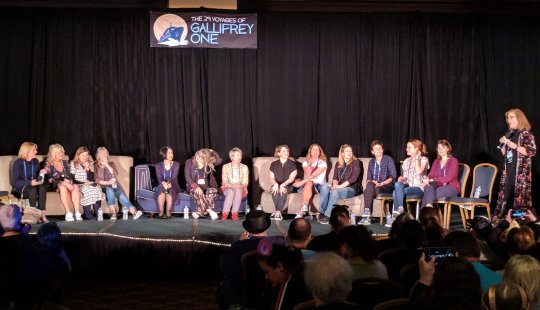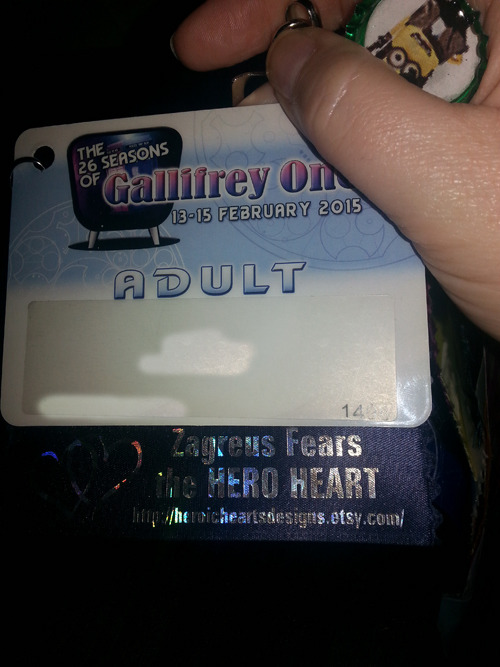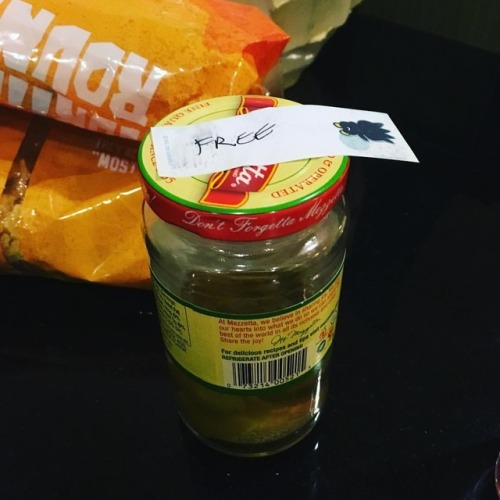#gally1
Anyone who just got home from Gallifrey One, if you received this ribbon (Zagreus Fears the HERO HEART) from me at any point during the convention? Send a picture of the ribbon to me on Etsy to receive a coupon code good for FREE SHIPPING anywhere in the US on any item in the shop.
(International customers will receive a coupon code good for a discount off their item instead. :-) )
Post link
At the last pre-pandemic #Gally1 all the way back at the start of 2020, an awesome @rassilonpod fan gave me this 3D-printed TARDIS keyring. Last week, after two and a half years of faithful service, the loop keeping it attached to our keys broke. Thank you for your service, TARDIS keyring.
•
#DoctorWho #DrWho #tardis
https://www.instagram.com/p/CePSWEOP5_m/?igshid=NGJjMDIxMWI=
Post link

This article contains descriptions of sexual harassment and mentions of sexual assault, as told by panelists at Gallifrey One.
On the final day of this year’s Gallifrey One convention in Los Angeles, fifteen women stepped on to the main stage for a monster of a panel titled “Gallifrey Waits No More.” Actors Sophie Aldred, Lisa Bowerman, Camille Coduri, Jessica Martin, Chase Masterson, Wendy Padbury, Jemma Redgrave, and Dee Sadler; writers Jenny Colgan, Sarah Dollard, and Rona Munro; script executive Lindsey Alford, costume designer Hayley Nebauer, and director Rachel Talalay joined writer and podcaster Deborah Stanish for a discussion about the changing landscape for women in the entertainment industry.
What occurred over the next hour was an experience that was simultaneously harrowing and cathartic as a #MeToo moment unfolded on stage. Nearly every panelist revealed a story of sexism, discrimination, harassment, or assault from their careers — some of which they were discussing for the very first time. Cast, crew, and fans were brought together in a shared moment of grief and solidarity. It was truly an exceptional moment that was unlike anything I’ve ever witnessed at a convention before.
The panel began with a broad conversation about what more could be done to support the careers of women in entertainment. Lindsey Alford shared her story of working with the rest of Doctor Who’s production team to ensure that she could keep working on the show while she was pregnant and raising her young children. It was a wonderful illustration of how to support working mothers.
Hayley Neubauer has a young child as well — her husband could occasionally be seen at the back of her panels during Gally with their baby in tow. When Alford was done speaking, Neubauer revealed that last year, while she was looking for a new job after her time on Doctor Who, she had been denied a job because she was pregnant. The entire audience gasped in shock. Rachel Talalay jumped in to point out that that decision was patently illegal. Still, Neubauer was told by the person who denied her the job that she would be “grateful” not to be working once she had the baby. Neubauer wondered why that person felt they could presume to make that decision on her behalf.
The mood in the room had noticeably shifted. But Neubauer wasn’t done. She explained that because of the nature of their work, anyone who works in costuming is often with actors as they are putting on or taking off their costumes. Most of those actors are professional during these moments — but some are not. Neubauer said that many of the women she knows who work in costuming have #MeToo stories, and that they all are watching as each new revelation comes out, waiting to see if the predators that they know about will be exposed.
Jemma Redgrave and Camille Coduri expressed their shock and rage at what Neubauer had revealed. That was part of what made this panel so powerful. Cast and crew were brought together in a place where they could share and hear each other’s stories. Barriers that isolated them were broken down.
Redgrave had stories of her own to share. She told the audience that when she was cast in her first film, she was told to lose weight. And when she went out to dinner with the director, he actually took her menu away and ordered her a plate of crudités.
Sophie Aldred had a similar experience. She had struggled with eating disorders as a young woman. After “Dragonfire” aired, she was told to lose half a stone (approximately 7 pounds) before the next season of Doctor Who was to be filmed. She was so furious that in the intervening time, she actually gained weight to spite them.
That wasn’t Aldred’s only story. When she was rehearsing for a one-woman show, a director attempted to pull down her pants. Dee Sadler had a similar story. While filming a scene for a movie that required her to be in a shirt and underwear, the director called her over and pulled down her underwear so another man could take a photo of her bare bottom.
The room came to an absolute standstill when Wendy Padbury took the microphone. She had never told anyone this story before. When she was 16 or 17 years old, she was asked to sing for an American producer for an audition. She was taken to a soundproof performance room. The producer played the piano while she sang her prepared piece. When she was done, he asked her to come around to the other side of the piano. He was masturbating. She immediately turned to leave the room, but he had locked the door. Thankfully, he unlocked the door when she asked him to do so, and she fled.

Photo credit: Joy Piedmont
This is both the power and devastation of the #MeToo movement. One person steps forward to tell their story and prompts another to share theirs. Sometimes, they just needed a boost of courage and a sense of solidarity to feel safe enough to share their story. Several of the women on the panel said they hadn’t thought about what had happened to them until they heard other women share their own stories. It is harrowing to share and hear these stories — but there’s something reassuring about realizing that we’re not alone.
You could see the shock, anger, and devastation on each of the panelists’ faces. Over 1,550 people were packed into the room at this point, and every single person was transfixed by what was unfolding on stage. The silence was only broken by the sound of a few quiet sobs as people in the audience wept.
On the stage, moderator Deborah Stanish noticed that the panelists seemed to forget the audience was there at times. Their panel discussion became a conversation among women — and they could have been ANY women — about their experiences.
There was grief and anger at this panel, but there was also a sense of hope and healing. The women talked about the relief they all felt at being able to talk about these issues together. And they advocated compassion for each other and for themselves.
And this brilliant panel was full of ideas about how to create change in the future. Sarah Dollard noted that programs designed specifically to promote the careers of women and POC writers and directors can help increase the diversity of the talent pool. Talalay added that those programs are only effective if participants are guaranteed jobs at the end. Otherwise, companies can take credit for “promoting diversity” without providing tangible results.
Chase Masterson noted as well that women often aren’t able to speak up because doing so could put their careers at risk. Studies have shown that women producers and directors hire more women crew members. And when more women are represented in all levels of a production, that can transform the culture and provide additional support for women to speak up about harassment.
Rona Munro said that we also need to think about the kinds of stories that movies and television are telling about women. She said that nine times out of ten, when someone writes a “strong female character,” that character is basically exactly the same as a male character. “Strong female characters” also rely extensively on violence and the use of weapons to establish their “strength.” She told the audience that “womens’ actual experiences are not seen as heroic. Womens’ actual lives are seen as sad and depressing. I want to start a campaign for telling womens’ actual stories and demonstrating how brilliant they are.”
To that point, Redgrave talked about how important her role as a lesbian woman is on the BBC show Holby City. From the fanmail she receives, she knows just how important it is for viewers to have that kind of visible representation — to have unique and interesting roles for women of a certain age, to show a lesbian woman on-screen, to show her in a relationship, and to show her interacting with other women in interesting ways that don’t revolve around men.
And as powerful as the panelists’ stories were, they admitted they were all limited in their perspectives. Nearly every single panelist was white (Jessica Martin revealed during the panel that she has Filipina and Burmese ancestry). Although Pearl Mackie was invited to Gallifrey One and would have been on that panel, she had to cancel her appearance after she was cast in a play in London.
Jenny Colgan and Masterson both highlighted the lack of women of color on the panel and made an explicit call for future conversations to include marginalized voices — including more WOC and LGBTQ voices — in order to represent a truly intersectional vision of the #MeToo movement. Dollard also noted that it was on all of us to demand that more women of color be hired to work on Doctor Who. In this show’s nearly 55 year history, not a single woman of color has ever been hired to write or direct a televised episode.
Dollard also pointed out that only the most splashy stories that feature the most high-profile abusers or victims get the most media attention. Even these panelists had a stage on which to share their stories. The vast majority of victims of sexual harassment or assault do not have that same platform.
Statistically speaking, there were likely many people in that audience who have experienced sexual harassment and assault. Had you asked every member of the audience who could also say #MeToo to stand, hundreds of us would’ve been on our feet. The #MeToo moment is happening all around us, from the top echelons of the entertainment industry to the hallways of your local convention. And even if we couldn’t all be on that stage, there was a sense of recognition and validation in that moment.
So, how do we move forward? Colgan told the audience to keep talking about #MeToo and the lack of representation for women. Padbury talked about how hard she worked throughout her life to foster her daughters’ and granddaughter’s ability to speak up and change the world around them — and how important it is to keep fostering those abilities in young women.
Aldred asked the audience to share their stories and to listen when others share their stories. Dollard reminded the audience to be allies for each other and to stand up in the moment when you see something awful happening, if it is safe for you to intervene. Coduri was personally in favor of giving harassers a good slap. And if you’re not comfortable doing that, well, Coduri seemed ready to take names and take justice into her own hands.
Talalay ended the panel by reminding us of the Twelfth Doctor’s final words: “Laugh hard. Run fast. Be kind.”
I’ve been thinking a lot about what it means to be kind, particularly in the context of #MeToo. I don’t think it means that we just have to be nice. I don’t think it means that every interaction needs to be sweet and pleasant, or that we can never say a harsh word to one another. I don’t think it means that there can never be conflict.
I think that being kind means that we have to fight for justice. It means that we have to work to build a world in which we are all respected and valued. It means that we have to stand up for one another and fight to keep each other safe. And it means that we have to be willing to speak out and hold each other accountable when we witness discrimination, harassment, and abuse.
To me, being kind means that I am less interested in protecting people from hard, uncomfortable conversations than I am in protecting the women who are bravely telling their stories and fighting to hold their harassers accountable.
Stanishreflected on Twitter after the panel that as hard as it may have been to witness this conversation or read about it afterwards, it was even harder for those women to live it, saying: “These amazing women didn’t owe us their pain and anger but they shared it with us anyway. Let’s make it worth something.”
When that panel concluded, I felt a sense of solidarity and purpose akin to what I felt during the Women’s March. The audience gave the panelists a standing ovation, and people were openly weeping and hugging as the lights came up and the stage cleared. It sparked a conversation that continued into the hotel lobby and onto Twitter that evening — one that will hopefully continue in the weeks and months to come. And hopefully, when this topic is revisited during next year’s Gallifrey One convention, we’ll have some tangible results to show for it too.
Note: This piece has been updated with a correction to Sophie Aldred’s story.




